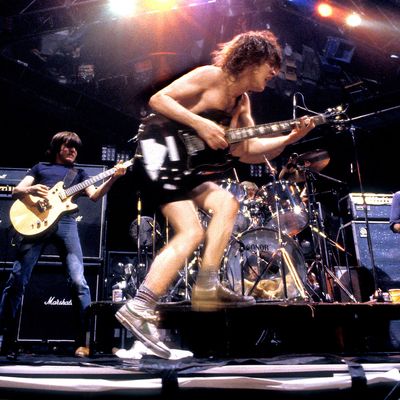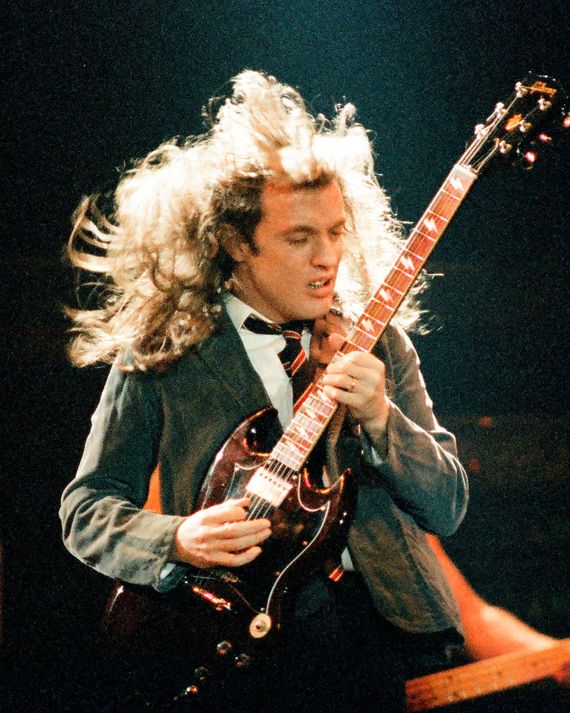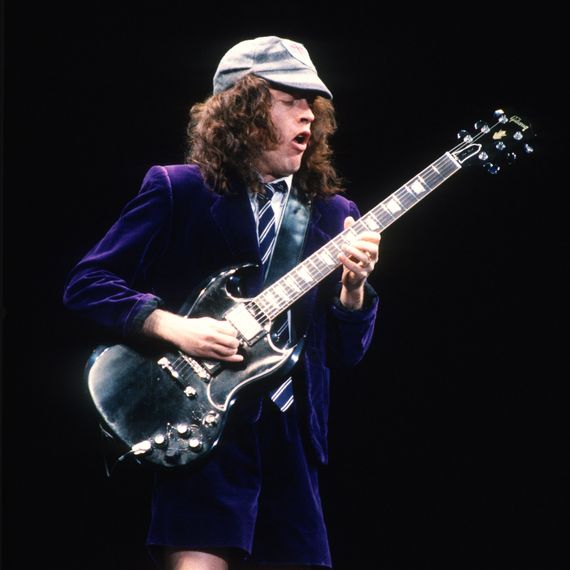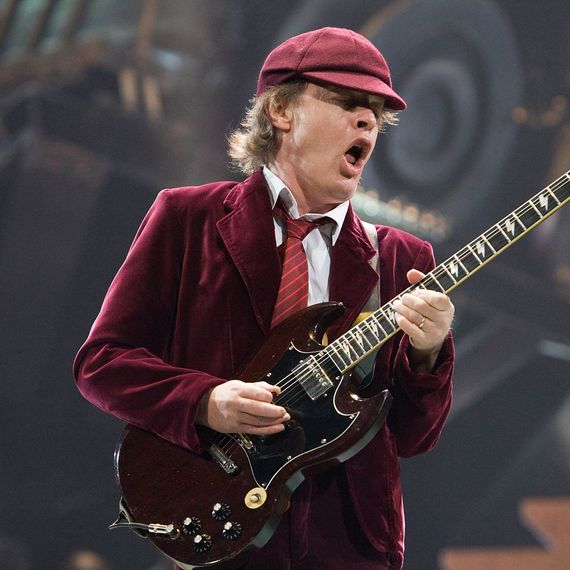
You don’t exactly need concrete shoes or cyanide to enjoy the debauched discography of AC/DC, but there’s something awfully appealing about the thought of blaring “Touch Too Much” whilst on a drunken rampage around your neighborhood with a bunch of fireworks, isn’t there? (Please do not attempt this.) With 18 albums, dozens of songs with “rock” in the title, and several lineup changes due to tragic deaths and less-tragic arrests, you know what you’re getting into before pressing play on AC/DC: It’s going to be loud, the finger-lickin’ riffs will give you blunt-force trauma, and the double entendres will make even the most prolific of lotharios blush. Don’t like their style? Think they’re a little too lowbrow? Who cares. Their longevity has made them one of the most poignant stories in rock music, and they created one of the best-selling albums of all-time, second only to Thriller.
Against all odds, AC/DC returned this year with a brand new No. 1 album, Power Up, with as close to its classic lineup as 2020 would allow: Co-founder and lead guitarist Angus Young, vocalist Brian Johnson, drummer Phil Rudd, bassist Cliff Williams, and rhythm guitarist Stevie Young. (Co-founder Malcolm Young died in 2017 following a battle with dementia, while Johnson, Williams, and Rudd all reversed course with their departures from years prior — due to hearing loss, general fatigue, and that aforementioned arrest, respectively.) Young, whose exuberance continues to be as youthful as his schoolboy outfits and duckwalks, is hopeful that the band will be able to give Power Up a proper tour in a post-COVID world, even if it means forgoing their usual arena show. “We want to get back out and do what we do, which is get on a stage and perform,” he said over a recent Zoom call, seated below a gorgeous floral watercolor. “If that’s in a club, a bar, that’s great. As long as it’s not a bunch of cars at a drive-in.”
Until we can bounce around to “Shoot to Thrill” from the mezzanine section once again, Young is here to discuss, often through fits of giggles, the highs and lows of AC/DC’s long history. And the filthiest and riff-iest, of course.
No. 1 AC/DC song
Oh, jeez. That can be very tough. I’m biased because I’ve been on them all, you know? [Laughs.] If I was just thinking of the guitar, since I’m a guitar player, I’d say “Riff Raff.” The guitar work was a challenge but interesting in the way the song rolled out. That’s my guitar answer. But if it’s for a whole song, “Thunderstruck” is a big one. I like that answer.
Most regrettable AC/DC song
On our first album, High Voltage, we did a love song called “Love Song.” That was very different for us. I didn’t know if we were trying to parody love songs of the time, because Bon [Scott, the band’s original vocalist before his death in 1980] wrote the lyrics. I don’t even remember what the words are. [Here’s a sample: “When you smile I see stars in the sky / When you smile I see sunrise.”] I remember that song because the guy who worked for us at our record label told us that’s what was on the local radio at the time — very soft music. His thought we should release that song, because it’ll probably get some airplay. I remember thinking, Who in their right mind would want this to go out?
We were very fortunate, though, because all of the radio stations who had seen us live knew this was not who we were. So these stations started to flip the record over and play the other song, which was a cover of a blues standard called “Baby, Please Don’t Go.” We actually scored a hit from the B-side! That was the one saving grace of the song.
Song whose meaning has changed the most for you
“Highway to Hell,” for many reasons. In the beginning, a lot of people thought it was satanic. What are they, a bunch of heretics? Are they trying to rewrite the bible? The actual song itself is such a road song, and that’s what it was intended to be in the beginning — our life on the road at the time, which was a lot of heavy touring. In our day, that’s how you sold and promoted records. You had to tour all the time. “Highway to Hell” stands the test of time. We still play it and the audience relaxes and sings along. There were a lot of people telling us at the time, How dare you, you’re going to cause suicides. We had to dig in and stick to our guns with it. And it got us our first gold record in the U.S. That was a surprise for a lot of people, even our record label [Albert Productions]. They told us, You’re the only band we’ve ever known who’s gone out and sold records as you’ve performed.
Song that reminds you most of your brother, Malcolm
This band was Malcolm’s creation and he put it all together. I don’t know about a specific song, so I’ll counter with the album that defined us as a band: Let There Be Rock. Our older brother, George, produced it and was our partner at the time. He asked me and Malcolm, “What would you like to do with this album? How do you want it to come out?” And Malcolm said, “We want an album that’s full-on guitar and in-your-face and pure hard rock.” That’s what we went for. Now that I’m thinking more about it, the song that sticks out the most from the album is “Whole Lotta Rosie.” That was a big track, a rock track. I’m not talking about sales or anything. When we play live everyone comes and expects to hear that song.
Filthiest song
[Laughs.] People have made our tracks filthier than they were originally intended, so over the years we’ve had different contenders. It might be “Night Prowler.” Listen, the song itself isn’t about any stalker or evil person. The idea came from when I was young, growing up in suburban Australia; we didn’t have air conditioning, and it was very hot. So if it was a very hot night, I’d open up the window. There was an alleyway next to our house and I used to get all of these animal night visitors. Sometimes they’d jump on the window ledge or attempt to come in. I’d see their shadows on the wall. These animals were always having a party late at night. For me, they were the “Night Prowlers.” The idea behind that track was more about nature. People like to take something and make it into what it’s not intended to be.
First song you’d play for a brand-new AC/DC listener
I think the song people would get straight away is “Back in Black.” It just rocks. It starts with one big punch with one big guitar. When you hear that one note, you think, This is what AC/DC is all about.
Guitar solo that doubles as the biggest endurance test
“Thunderstruck.” I had been playing around with an acoustic guitar, of all things, and Malcolm heard what I was playing and kept pestering me about it. You should keep working on that! When you hear it, it all comes into place. When we perform it live, I have to sit down for an hour and make sure I’ve got my fingers warmed up to take on that track. It’s got an unrelenting intricacy. I have to be confident whenever I play it.
Guitar riff that achieves platonic ideal status
“Riff Raff.” That’s straight-up rock and roll. It’s got a Chuck Berry style in it, but also has a swing groove that’s unique to AC/DC. For a guitar player, it’s a perfect rock piece. A lot of music types very much like that album it was on, Powerage, because it has a life of its own — especially that song.
Favorite bad review
When our first album came out … well, it was the first album of ours that came out in America, [1976’s] High Voltage. Rolling Stone’s review called us “one of the worst bands in the world” and had us listed way down at the bottom. I was like, Well, I guess we’ve got room for improvement. [Laughs.] At that time, Rolling Stone was really into the punk genre and were matching up everything to what was the current flavor of the day. What we did was rock and roll and we weren’t going to change anything.
The legacy of Back in Black being No. 84 on Rolling Stone’s 500 Greatest Albums of All Time list
Back in Black was a unique album that came out at a very specific time [1980]. I often think about how to attribute its success to that. I put it down to the songs themselves. You’re lucky if you put out an album that had very strong songs to begin with. Plus, it came out after Bon’s death. A lot of people thought we were finished as a band, so it was surprising in itself that Back in Black came out at all. When we were making it, it was a do or die effort. We figured, if it was our last album, let’s make it a damn good one. I remember the record label going, “The situation is bad enough as it is, and you want to cover the album in black, too?” We wanted the cover to be a sign of mourning for Bon — it was a tribute for him. And of course we had “Hells Bells” for him, too. At the beginning, people would just look at the song titles and go, I don’t think so. But it struck a chord with the public when they actually listened and it grew on them. It wasn’t instant, but it grew on them.
From the very beginning as a band, we never looked for attention. At the time for rock music, there was always limited press and reviews. Especially for us being based in Australia, too. We never set out for prizes or awards like that. If you asked me in my early 20s, I always thought of those people as uncool. It was an uncool world. My viewpoint was if something was on television, it was finished. I always liked the underdog. Even our record company didn’t even bother mentioning we were on their label. [Laughs.] I think the first time Rolling Stone gave us praise was 30 years after we started. They actually confirmed AC/DC does exist; they put us on the cover [in 2008]. Malcolm would always say, “Do we really want to be on this?” It was the same thing with the Rock and Roll Hall of Fame induction [in 2003]. Malcolm said he would’ve preferred if they just ignored us. He would’ve been happier with that. That was never our role. It’s more of a Hollywood kind of thing — the glitterati. We performed, and continue to perform, for the little people. And I can say that because I’m 5”2.
Unlikeliest AC/DC fan
I can’t remember the exact year, but somebody told us that a monastery up in Tibet is loaded with AC/DC fans. You know, people going into that monastic life. That was a surprise. You never know if what you do gets out there around the world, and then it comes up in the strangest places.
Most useful criticism you’ve ever received
Always from my brothers. George and Malcolm would say to me from the very beginning, “If you want to do the guitar solos, get right up in the front and make it flash.” When I was very young, I was a bit timid and would prefer to play in the back and not seek out attention. Malcolm would always force me up to the front to remind the audience I’m doing something.
Schoolboy uniform with the most sentimental value



It would have to be one of the early ones, which was my own uniform from school; I went to a normal state school and we wore uniforms. I had a school blazer and my sister adapted the blazer for me to wear while performing. She made it a little bit tougher — put some bands and patches on it. It’s always a good reminder that I’m a product of state education. People don’t know if that’s a good thing or a bad thing. [Laughs.] I have them all in storage. It’s not climate-controlled or anything, but they have a nice home.


